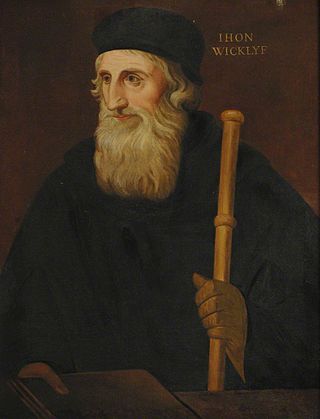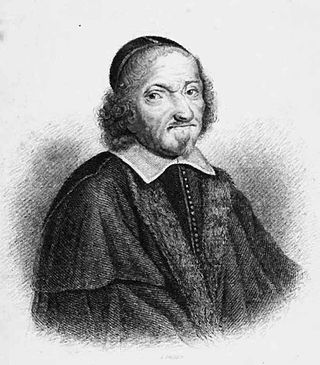Related Research Articles

John Wycliffe was an English scholastic philosopher, Christian reformer, Catholic priest, and a theology professor at the University of Oxford. Wycliffe is traditionally believed to have advocated or made a vernacular translation of the Vulgate Bible into Middle English, though more recent scholarship has minimalized the extent of his advocacy or involvement for lack of direct contemporary evidence.

The King James Version (KJV), also the King James Bible (KJB) and the Authorized Version (AV), is an Early Modern English translation of the Christian Bible for the Church of England, which was commissioned in 1604 and published in 1611, by sponsorship of King James VI and I. The 80 books of the King James Version include 39 books of the Old Testament, 14 books of Apocrypha, and the 27 books of the New Testament.
William Tyndale was an English Biblical scholar and linguist who became a leading figure in the Protestant Reformation in the years leading up to his execution. He translated much of the Bible into English, and was influenced by the works of prominent Protestant Reformers such as Martin Luther.

Myles Coverdale, first name also spelt Miles, was an English ecclesiastical reformer chiefly known as a Bible translator, preacher, hymnist and, briefly, Bishop of Exeter (1551–1553). In 1535, Coverdale produced the first printed translation of the full Bible into Early Modern English, completing the translations of William Tyndale.

The Matthew Bible, also known as Matthew's Version, was first published in 1537 by John Rogers, under the pseudonym "Thomas Matthew". It combined the New Testament of William Tyndale, and as much of the Old Testament as he had been able to translate before being captured and put to death. Myles Coverdale translated chiefly from German and Latin sources and completed the Old Testament and Biblical apocrypha, except for the Prayer of Manasseh, which was Rogers', into the Coverdale Bible. It is thus a vital link in the main sequence of English Bible translations.

The Great Bible of 1539 was the first authorised edition of the Bible in English, authorised by King Henry VIII of England to be read aloud in the church services of the Church of England. The Great Bible was prepared by Myles Coverdale, working under commission of Thomas Cromwell, Secretary to Henry VIII and Vicar General. In 1538, Cromwell directed the clergy to provide "one book of the Bible of the largest volume in English, and the same set up in some convenient place within the said church that ye have care of, whereas your parishioners may most commodiously resort to the same and read it."
This article contains information about the literary events and publications of 14th century.
This article is a list of the literary events and publications in the 15th century.
This article presents lists of literary events and publications in the 16th century.
This article contains information about the literary events and publications of 1663.
This article contains information about the literary events and publications of 1610.
This article contains information about the literary events and publications of 1581.
This article contains information about the literary events and publications of 1580.
This article contains information about the literary events and publications of 1551.
This article contains information about the literary events and publications of 1530.
This article contains information about the literary events and publications of 1520.
Early Modern English Bible translations are those translations of the Bible which were made between about 1500 and 1800, the period of Early Modern English. This was the first major period of Bible translation into the English language including the King James Version and Douai Bibles. The Reformation and Counter-Reformation led to the need for Bibles in the vernacular with competing groups each producing their own versions.

The Tyndale Bible (TYN) generally refers to the body of biblical translations by William Tyndale into Early Modern English, made c. 1522–1535. Tyndale's biblical text is credited with being the first Anglophone Biblical translation to work directly from Greek and, for the Pentateuch, Hebrew texts, although it relied heavily upon the Latin Vulgate and German Bibles. Furthermore, it was the first English biblical translation that was mass-produced as a result of new advances in the art of printing.
Events from the 1530s in England.

Bible translations in the Middle Ages went through several phases, all using the Vulgate. In the Early Middle Ages, written translations tended to be associated with royal or episcopal patronage, or with glosses on Latin texts; in the High Middle Ages with monasteries and universities; in the Late Middle Ages, with popular movements which caused, when the movement were associated with violence, official crackdowns of various kinds on vernacular scripture in Spain, England and France.
References
- ↑ Blunt, J. (1869). The Reformation of the Church of England – its history, principles and results (A.D. 1514–1547). London; Oxford; Cambridge: Rivingtons. pp. 444–445.
- ↑ Daniell, David (2003). The Bible in English: history and influence . New Haven; London: Yale University Press. p. 448. ISBN 0-300-09930-4.
- ↑ Robin, Diana Maury; Larsen, Anne R.; Levin, Carole (2007). Encyclopedia of Women in the Renaissance: Italy, France, and England. ABC-CLIO. p. 221. ISBN 9781851097722.
- ↑ Legouis, Émile (1926). A History of English Literature. Vol. 1. London: Dent. p. 156.
- ↑ Satish Saberwal, Mushirul Hasan (2006). Assertive religious identities: India and Europe. Manohar. ISBN 81-7304-673-5, ISBN 978-81-7304-673-5.